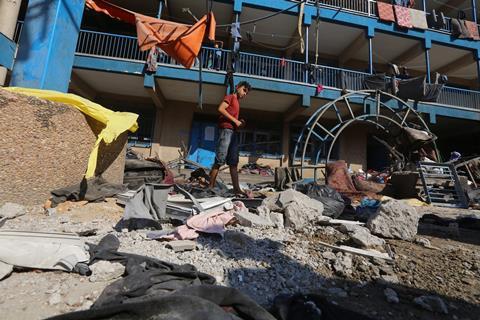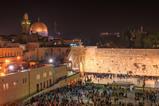The Foreign Secretary has announced the UK will reinstate funding to the UN’s agency for Palestinian refugees. But citing claims that UNRWA employees took part in the 7 October terrorist attacks, Dr James Patrick says Christians should oppose the decision

Jesus taught that how we treat those without food, health, or clothing in this age will determine our own eternal well-being in the age to come (Matthew 23:31-46). Civilians living in warzones are prime candidates for Christian aid, not least the people of Gaza suffering greatly for the sins of their elected Hamas government. But since we are also called to be peace-makers (Matthew 5:9), our generosity should not inadvertently perpetuate injustice and conflict.
Last week, the UK’s new Foreign Secretary, David Lammy, announced the lifting of a temporary freeze on British funding to the UN Palestinian agency UNRWA. In January, Israel had provided evidence that twelve UNRWA employees took part in the horrific October 7 attack, and many countries froze funding pending a proper investigation. In April, Catherine Colonna published her audit (hardly independent), which has restored much international confidence in and funding for the agency. But deeper systemic problems remain unaddressed, reaching the very root of this conflict. Christians who care about the Palestinian people will want to make sure our taxes are truly of benefit to them.
Refugee status
The history of the Jewish people and their neighbours in this land goes back millennia, and both Old and New Testaments anticipate an eventual return of Israel’s descendants to the land promised to him (e.g., Deuteronomy 30:4-6; Amos 9:15; Luke 21:24). These promises motivated Christian Britain to lobby the Turkish Ottoman Empire for a Jewish homeland in Palestine, unsuccessfully. So, after defeating the Ottomans in the first world war, we agreed with our allies to facilitate its “reconstitution” in former colonial Ottoman lands, alongside several new Arab states. Civil and religious rights of minorities were explicitly to be protected. Yet when the State of Israel declared independence in 1948 on this understanding, it was promptly attacked by five Arab armies trying to snuff out any Jewish autonomy in the land. This war resulted in Egypt’s Gaza enclave and Jordan’s West Bank, forcibly emptied of its Jewish minority.
Later state-formation along ethnic and religious lines following the second world war often caused huge population transfers, as for example the 15 million who migrated during the India–Pakistan partition in 1947. The war in the one-quarter of Palestine west of the River Jordan resulted in the nakhba or ‘catastrophe’ of around 750,000 Arab refugees fleeing, but also around 800,000 Jewish refugees from North African and Middle Eastern countries fleeing into Israel and being absorbed in following months. Shortly after the ceasefire in 1949, the United Nations set up its Relief & Works Agency (UNRWA) for any Arab refugees who had resided in what was now Israeli territory for as little as the two years prior to war in 1948.
One year later, in 1950, the UN created its High Commission for Refugees (UNHCR) with a worldwide mandate, the only exception being the Arab refugees from Western Palestine who already had a refugee agency. But there is a key difference. UNHCR endeavours to repatriate refugees if possible, or else naturalise them as citizens of a new country. UNRWA uniquely grants refugee status also to all descendants of those who fled in 1948–49, even the 80 per cent or so who are now full citizens of other countries. This includes voting citizens of Jordan, Gaza, or the Palestinian Authority in the West Bank. So the number of Palestinian ‘refugees’ has ballooned to six million and counting, all defined solely by the impossible dream of relocating to Israel proper. That is quite the opposite of a ‘two-state solution’ as most understand it.
No solutions
By their own admission, “UNRWA does not have a mandate to seek durable solutions for Palestinian refugees.” On the contrary, its existence is a disincentive for neighbouring Syria and Lebanon to offer them equal rights as citizens, despite them sharing the same language and ethnicity with their Arab brothers.
Within the Palestinian territories of Gaza and the West Bank, UNRWA’s massive budget for education, health care, social services, infrastructure, and humanitarian aid, fosters an unhealthy culture of dependency and prevents the Palestinian Authority (PA) from taking responsibility for its own citizens and economy, as a prospective state must be able to.
In fact, UNRWA’s impact on the conflict with Israel has been not just unhelpful but actively harmful. UNRWA schools infect whole generations of Palestinian children with antisemitism and glorification of violence, dehumanising Jews as “Zionist occupiers” in the PA textbooks their schools use. Worse still, the summer camps they hold in the refugee camps indoctrinate children to seek martyrdom and murder Jews.
Victims of October 7 are suing UNRWA for $1 billion
Since 99.2 per cent of UNRWA staff are recruited from the local population, its principle of political neutrality can hardly be maintained when the de facto government of Gaza are terrorists. UN Watch, a Geneva-based watchdog, has since October 7 accumulated dozens of pieces of evidence that UNRWA in Gaza has been fully infiltrated by Hamas. These range from UNRWA’s inability to prevent Hamas using their buildings to launch rocket attacks on Israel and stealing their aid, fuel, vehicles and machines; to supplying premises and electricity for Hamas terrorists, command centres and data centres, along with tunnel entrances; to turning a blind eye (at best) to their employees being terror operatives for Hamas and Palestinian Islamic Jihad who participated in October 7 or supported it on social media or even held Israeli hostages personally. Victims of October 7 are therefore suing UNRWA for $1 billion, and the Israeli Knesset is currently advancing a bill labelling UNRWA as a terrorist organisation.
The ultimate defence of UNRWA to these serious criticisms by UN Watch and others, is that they are an “irreplaceable lifeline” for the Palestinian people in Gaza and elsewhere, due to their size and local knowledge. Yet this is precisely what keeps the Palestinians dependent upon outside aid instead of self-government. And the UNRWA chief Philippe Lazzarini has admitted that the real reason for preserving UNRWA is ideological. The supposed ‘right of return’, their raison d’être, rejects Israel’s ‘both/and’ approach to ethnic coexistence in the land, in favour of an ‘either/or’ that would supplant God’s age-old promise to bring the Jewish people home.
If we care for the Palestinian people and for lasting peace with Israel, it is time for UNRWA to go.






































2 Readers' comments